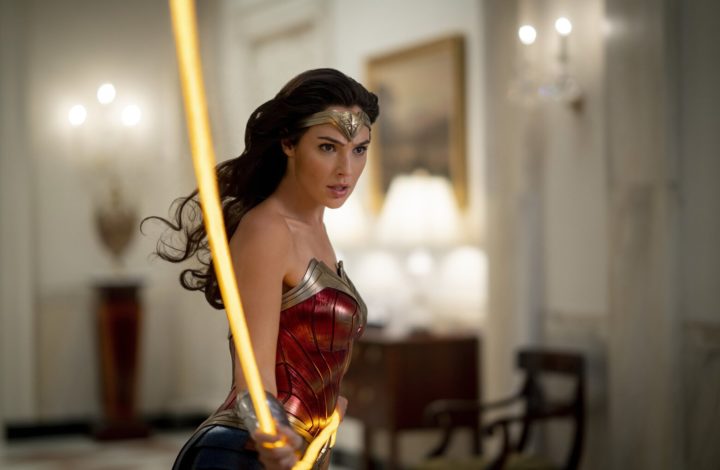
MPAA Rating: PG-13 | Rating: ★★½
Release year: 2020
Genre: Adventure, Fantasy, Superhero Director: Patty Jenkins
Wonder Woman 1984 (aka WW84) opens with a young Diana (Lilly Aspell) competing in an American Gladiators-style athletic competition on the Amazon island of Themyscira, where she (and we, the audience) learn a valuable lesson from Antiope (Robin Wright) about the importance of Truth with a capital T. Following this, the film shifts into a nostalgic sendup of the Donner-era Superman films as the now-grown Diana Prince (Gal Gadot) stops various petty crimes from occurring around Washington D.C. in 1984, culminating in her apprehension of some goofball thieves robbing a mall jewelry store. It’s colorful and campy, and had the remainder of WW84 maintained this blend of humor, adventure, and fun, it might have been a delightful cinematic escapist romp at the close of what has been a difficult year (to say the least). Yet where the 2017 Wonder Woman is my favorite of the DCEU franchise, WW84 left me with mixed feelings; while many of the themes are obviously relevant and the performances are excellent all around, the film is ultimately narratively overstuffed and visually underwhelming. In short, it’s lacking in wonder.
The bad guy of WW84 is Maxwell Lord (the Mandalorian himself, Pedro Pascal), a clear cipher for Trump and the worst of 1980s-era American excess and narcissism. With glossy hair and a golden tongue, Lord is a conman and a loser, a fraudulent businessman who banks the future of his company on acquiring a magical wish-giving stone which just so happened to be in possession of the aforementioned mall jewelry store. When the stolen artifact ends up in the Smithsonian where Diana works, wishes are made and granted, which leads to the magical return of Diana’s lost love, Steve Trevor (Chris Pine). Diana’s overlooked co-worker, gemologist Barbara Minerva (Kristen Wiig) also makes a wish: to be like Diana, a request which is granted in more ways than one by the film’s coda.
WW84 shines brightest when Gadot and Pine are on-screen together. They’re two gorgeous, captivating people, and their romantic chemistry is delightfully apparent as they flirt and become reacquainted after Steve Trevor’s 50+ year absence. Wiig is also noteworthy for her empowering portrayal of Barbara, subtly shifting from timid to threatening over the course of the film without ever slipping into overly-comical caricature. But it’s Pascal who generally stands out here— channeling the spirits of Gene Hackman’s Lex Luthor and Michael Douglas’s Gordon Gekko, Pascal looks like he’s having a blast in the over-the-top Trumpish villain role.
Yet there’s simply too much happening within the plot of WW84 to allow us a solid empathetic anchor. As the film attempts to devote significant amounts of its 2 1/2-hour runtime to three parallel narratives—Diana/Steve, Barbara/Diana, and Lord/his son Alistair (Lucian Perez)—it’s like a mashup of 1980s movie genres: rom-com, action/disaster flick, and superhero movie all rolled up into one. Director/writer Patty Jenkins, along with her co-writers Dave Callaham and Geoff Johns, stretch out scenes to their limit in order to elicit the greatest emotional response while challenging our attention span. This is most apparent in an over-long perfunctory chase/battle scene set in Egypt, where Diana and Steve attempt to confront Lord about his wish-giving scheme. Vehicles are smashed, guns are fired, and in the final moments there are two young children playing on the roadway, apparently oblivious to the massive explosions happening nearby. Diana is forced to fling herself in the path of chaos in order to save these poor young souls, thus allowing Lord and Co. to escape. This “save my child!” trope happens at least three other times in WW84; when it’s employed once in a film, it can be effective (albeit emotionally manipulative), but multiple times and it feels like children and women are being used rather than honored in order to gain the audiences’ sympathies. I had also hoped for more awe-inducing visuals akin to the “no man’s land” scene in Wonder Woman or the strikingly vibrant rainbow colors of the movie poster. There a few such moments, such as Steve and Diana flying an invisible jet though exploding fireworks, or Diana teaching herself how to fly through the clouds on her own power. Yet these moments are few and far between, and the nighttime finale is the now-typical CGI-laden aesthetic we’ve come to know from DCEU films: gray, dull, and monotone.
Ultimately, the powerfully-preached theme in WW84 is the significance of truth and not allowing wanton or selfish desires to overtake our moral compasses. In this way, it speaks directly to our epistemically-challenged era, where reality itself is often ignored for the sake of political allegiance and the perception of power. Yet I also wonder if another message gets lost in the mix; where truth ultimately reigns over lies, WW84 also inadvertently sends a message of “let’s get things back to normal and just keep things how they are.” In a world which desperately needs change and reform, this decimation of wishes and dreams can be honestly depressing, if not oppressive. Of course, how things change really matters, and we cannot justify the ends by enacting unethical or selfish means. I just wonder if the apparent message of WW84—to embrace the difficult truth rather than wishful lies—might be less hopeful for some viewers who are truly yearning for systemic justice and social change, good desires which can’t simply be dismissed as “wishful thinking.”
IMDB Listing: https://www.imdb.com/title/tt7126948/